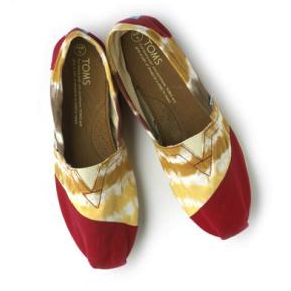 In this month’s Sunday Telegraph column, I examine the peculiar business model of the insanely popular American company, TOMS Shoes. Every time TOMS sells a pair of shoes to one of its customers, it gives away a pair to someone in need.
In this month’s Sunday Telegraph column, I examine the peculiar business model of the insanely popular American company, TOMS Shoes. Every time TOMS sells a pair of shoes to one of its customers, it gives away a pair to someone in need.
Turns out this the BO-GOA (Buy One – Give One Away) approach might apply more broadly than we think. And its emphasis on the purpose motive has lessons for businesses of every kind.
You can read the full column on the Telegraph site.
Meantime, as a special treat for Pink Blog readers, TOMS founder Blake Mycoskie agreed to answer three additional questions about the company, its mission, and its model. You can find that short interview here.
I’ve read that one tremendous downside of this good-spiritedness is that 3rd world countries can’t compete by selling their own-made clothes and shoes… not with the West’s free wear…
@stacy — That’s a really interesting point — and one that hadn’t occurred to me. I wonder if it inhibits local businesses or whether it might actually help businesses by developing a market or equipping people with slightly more buying power by getting an essential at no cost. Great question.
stacy how many tom’s shoes could possibly be given away vs how many people are in need of shoes and would buy them if they could?
Hi Dan. Ears been burning? Have been having many conversations lately about your assertion that monetary reward leads to linear thinking…thereby fighting with tasks requiring non-linear thinking (my attempt at a faithful paraphrase anyway). The point that non-monetary purpose and meaning-centric rewards encourage innovation isn’t controversial. But the assertion that monetary rewards cut innovation in cerebral tasks certainly leads to colorful discussions.